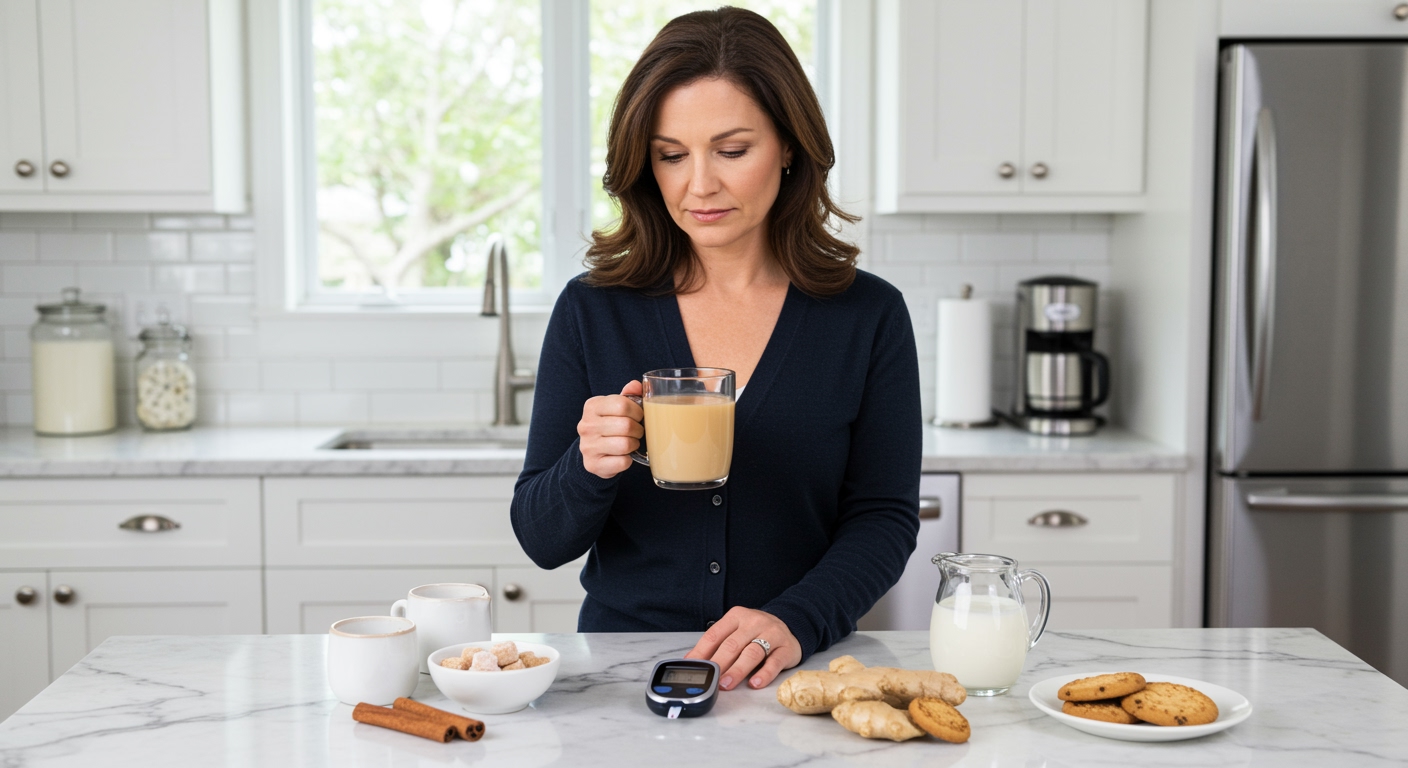✪ Key Takeaway: Milk tea can be enjoyed by diabetics when prepared with sugar-free sweeteners and consumed in moderation as part of a balanced diet.
Introduction
Your morning ritual includes that perfect cup of milk tea, but now diabetes has entered your life like an unwelcome guest.
You might be wondering if you need to give up this comforting beverage forever or if there are ways to keep enjoying it safely.
Hi, I’m Abdur, your nutrition coach, and today I’m going to explain exactly how milk tea affects your blood sugar and share practical strategies for making it diabetes-friendly.
How Does Milk Tea Affect Blood Sugar Levels?
Traditional milk tea contains three main ingredients that directly impact your blood glucose: tea, milk, and sugar.
The added sugar in milk tea causes the most dramatic spike in blood sugar levels within 15-30 minutes of consumption.
A typical cup of sweetened milk tea contains 20-30 grams of sugar, which equals about 6-8 teaspoons of pure sugar hitting your bloodstream.
Milk contributes natural sugars called lactose, which breaks down into glucose and galactose during digestion.
One cup of whole milk adds approximately 12 grams of natural sugar to your beverage, creating an additional glycemic load.
The tea itself contains virtually no carbohydrates, but the combination of milk and added sweeteners transforms this innocent leaf into a blood sugar challenge.
Research shows that beverages with high sugar content can cause blood glucose levels to rise by 50-100 mg/dL within one hour of consumption.
✪ Fact: Black tea contains compounds called tannins that may actually help slow sugar absorption when consumed without added sweeteners.
What Makes Some Milk Teas Worse Than Others?
Commercial milk tea preparations often contain hidden sugars that make them particularly dangerous for diabetics.
Bubble tea shops and cafes frequently use flavored syrups, condensed milk, and artificial sweeteners that create unpredictable blood sugar responses.
Condensed milk contains approximately 55% sugar by weight, making it one of the worst choices for blood sugar control.
Instant milk tea powders typically contain corn syrup solids, artificial flavors, and trans fats that compound the glycemic impact.
The portion size also matters significantly, as many commercial establishments serve 16-24 ounce portions instead of standard 8-ounce cups.
Flavored milk teas like vanilla, caramel, or chocolate contain additional sugar sources that can double or triple the carbohydrate content.
Temperature affects absorption rates, with hot beverages potentially causing faster sugar uptake compared to iced versions.
✪ Pro Tip: Always ask for the ingredient list at commercial tea shops to identify hidden sugar sources before ordering.
Can You Make Diabetes-Friendly Milk Tea At Home?
Creating diabetes-friendly milk tea at home gives you complete control over every ingredient and its impact on your blood sugar.
Start with high-quality loose leaf tea or tea bags, which provide antioxidants and beneficial compounds without any carbohydrates.
Replace regular milk with unsweetened almond milk, which contains only 1-2 grams of carbohydrates per cup compared to 12 grams in dairy milk.
Use natural sugar substitutes like stevia, erythritol, or monk fruit sweetener that do not raise blood glucose levels.
Add warming spices like cinnamon, cardamom, or ginger, which may help improve insulin sensitivity and add flavor without carbohydrates.
Cinnamon specifically has been shown in studies to help lower fasting blood glucose levels by 10-29% when consumed regularly.
Prepare your tea stronger than usual to compensate for the dilution from milk alternatives and maintain that rich, satisfying taste.
✪ Note: Coconut milk contains more carbohydrates than almond milk, so use it sparingly if you choose this option.
When Is The Best Time To Drink Milk Tea With Diabetes?
Timing your milk tea consumption can significantly impact how your body processes the sugars and manages blood glucose levels.
Morning consumption works best because your body has higher insulin sensitivity after an overnight fast, making glucose processing more efficient.
Avoid drinking milk tea on an empty stomach, as this causes rapid absorption and dramatic blood sugar spikes.
Pair your milk tea with a protein-rich snack or meal to slow down sugar absorption and create a more gradual glucose response.
Evening consumption should be avoided because nighttime insulin resistance can make blood sugar control more challenging.
Post-exercise timing can be beneficial because physical activity increases glucose uptake by muscles for up to 48 hours.
Monitor your individual response patterns by checking blood glucose 1-2 hours after consumption to identify your optimal timing.
✪ Pro Tip: Keep a food diary to track how different timing affects your personal blood sugar patterns.
What Are The Healthier Alternatives To Traditional Milk Tea?
Several delicious alternatives can satisfy your milk tea cravings while keeping your blood sugar stable and supporting your diabetes management goals.
Green tea with a splash of unsweetened coconut milk provides antioxidants and minimal carbohydrates while maintaining creamy texture.
Herbal teas like chamomile, peppermint, or rooibos offer naturally sweet flavors without requiring additional sweeteners.
Matcha lattes made with unsweetened plant milk deliver sustained energy without the blood sugar rollercoaster of traditional milk tea.
Turmeric golden milk using unsweetened almond milk and natural spices provides anti-inflammatory benefits alongside great taste.
Cold brew tea concentrates mixed with small amounts of heavy cream create richness with minimal carbohydrate impact.
Experiment with different tea varieties like oolong, white tea, or pu-erh, which offer unique flavors and potential metabolic benefits for diabetes management.
✪ Fact: Oolong tea has been shown to help increase fat burning and may improve insulin sensitivity in some studies.
The Bottom Line
Milk tea does not have to disappear from your life because of diabetes, but it does require thoughtful preparation and mindful consumption.
Smart choices create sweet moments without bitter consequences, and your health deserves both enjoyment and protection.
I would love to hear about your favorite diabetes-friendly milk tea recipes or any questions you have about managing beverages with diabetes in the comments below.
References
At NutritionCrown, we use quality and credible sources to ensure our content is accurate and trustworthy. Below are the sources referenced in creating this article:





